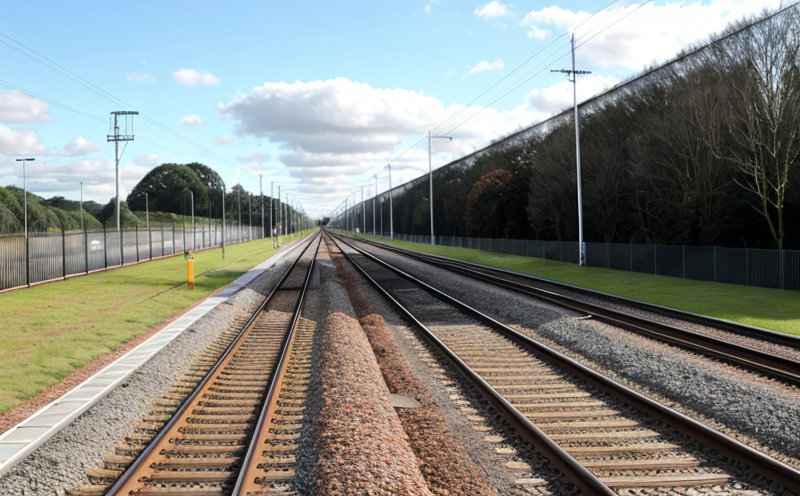EN 16272 Vibration and Noise Testing of Rail Pads
The European Standard EN 16272 specifies the methods for determining the vibration and noise characteristics of railway vehicle undercarriage components, including rail pads. This standard is particularly relevant to ensuring the safety, comfort, and performance of railway systems across Europe.
Rail pads are critical components that provide a stable interface between the wheel and the track, helping to distribute loads evenly and reduce wear and tear on both the wheels and the track infrastructure. The testing outlined in EN 16272 is essential for verifying the quality of these components before they are integrated into railway vehicles.
The standard covers various parameters such as vertical deflection, lateral stiffness, damping performance, and sound emission levels. These metrics are crucial for assessing the operational efficiency, durability, and compliance with safety regulations. By adhering to EN 16272, manufacturers can ensure their rail pads meet stringent international standards, enhancing overall vehicle reliability.
The testing process involves subjecting samples of the rail pads to a series of controlled conditions that simulate real-world operating environments. This includes varying speeds and loads to evaluate how well the pads perform under different stress scenarios. The results provide valuable insights into the dynamic behavior of the materials used in rail pads, helping engineers optimize designs for better performance.
Compliance with EN 16272 is not just about meeting regulatory requirements; it also reflects a commitment to innovation and excellence in railway technology. By incorporating this standard into quality assurance processes, manufacturers can build trust with customers and stakeholders, ensuring they receive products that are reliable and safe for long-term use.
Moreover, the insights gained from these tests allow for continuous improvement of rail pad designs, leading to more efficient and sustainable transportation solutions. As global demand for eco-friendly and high-performance infrastructure continues to grow, meeting standards like EN 16272 becomes increasingly important.
In summary, EN 16272 provides a comprehensive framework for evaluating the vibration and noise characteristics of rail pads, ensuring they meet rigorous quality benchmarks. This standard plays a vital role in enhancing railway systems' performance, safety, and longevity, making it an indispensable tool for industry professionals.
Why It Matters
The importance of EN 16272 cannot be overstated when considering the critical role rail pads play in ensuring safe and efficient transportation. Vibration and noise testing under this standard helps identify potential issues early on, allowing for necessary adjustments before deployment.
- Enhanced Safety: Ensures that rail pads contribute to a safer riding experience by minimizing vibrations and reducing noise levels, which can be particularly beneficial in high-speed trains.
- Prolonged Lifespan: By adhering to this standard, manufacturers can extend the useful life of their products, leading to reduced maintenance costs over time.
- Better Performance: Tests reveal how well rail pads perform under various conditions, guiding improvements that enhance overall vehicle efficiency.
- Environmental Impact: Optimizing rail pad design through these tests can lead to more sustainable transportation options with lower noise pollution and reduced energy consumption.
In essence, compliance with EN 16272 is not just a technical requirement but a strategic decision that contributes significantly to the advancement of railway technology. It supports continuous improvement in product quality while fostering trust among end-users.
Benefits
The benefits of adhering to EN 16272 extend beyond mere compliance; they offer tangible advantages that can positively impact various aspects of the rail industry:
- Risk Mitigation: By identifying potential issues early, manufacturers can avoid costly recalls and reputational damage.
- Cost Efficiency: Ensuring product quality upfront saves money on后期





